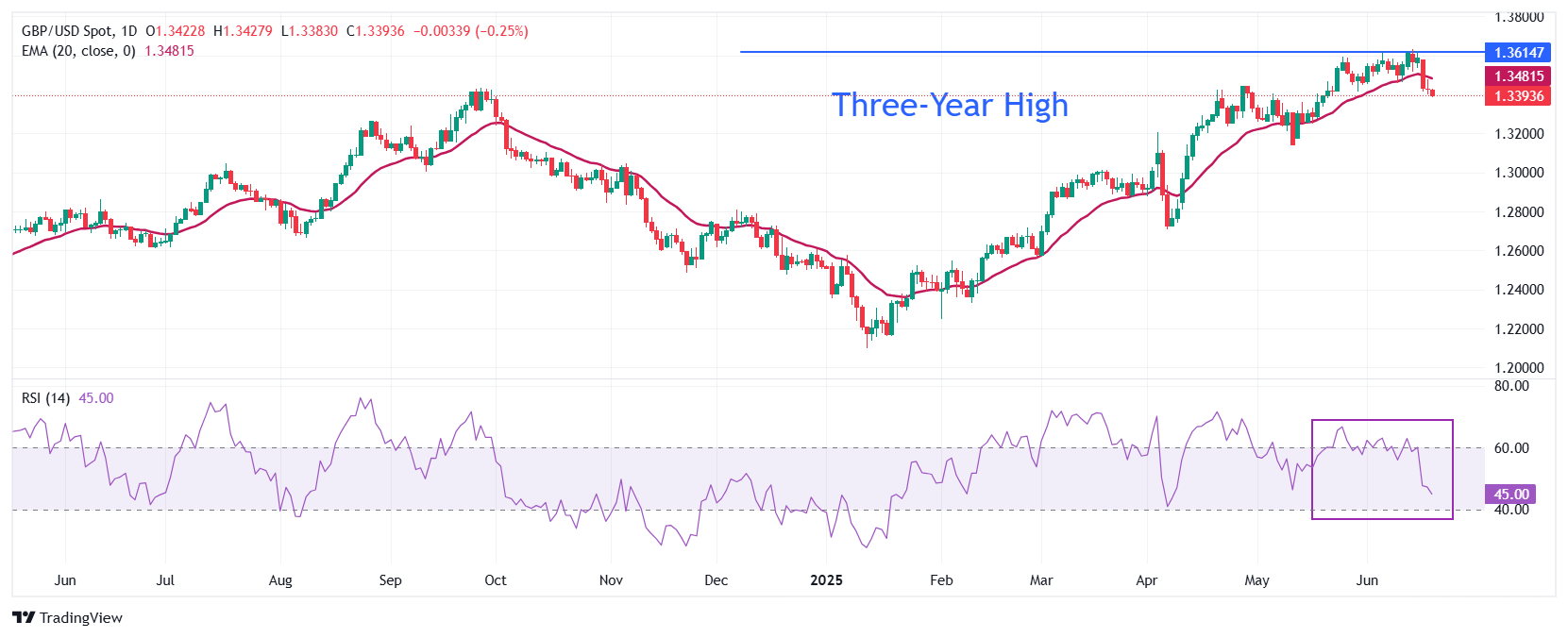Pound Sterling faces selling pressure ahead of BoE’s monetary policy announcement

The Pound Sterling trades weakly against its major peers on Thursday ahead of the BoE’s monetary policy announcement.
The BoE is expected to keep interest rates steady at 4.25%, with a 7-2 majority vote.
Middle East tensions escalate over the possibility of the US striking Iran.
The Pound Sterling (GBP) trades lower against its major peers, except antipodeans, on Thursday. The British currency faces selling pressure ahead of the Bank of England’s (BoE) monetary policy announcement due at 11:00 GMT.
Investors expect the BoE to leave interest rates steady at 4.25%, with a 7-2 majority vote. BoE Monetary Policy Committee (MPC) members, Swati Dhingra and Alan Taylor, are expected to support an interest rate cut, as they endorsed a larger-than-usual rate reduction by 50 bps in the May policy meeting.
BoE Governor Andrew Bailey guided a "gradual and careful" stance to the monetary expansion path in May, reiterating that “risks to inflation returning sustainably to the 2% target in the medium term have dissipated”.
Meanwhile, financial market participants expect the BoE to reassess its moderate policy-easing approach after the latest batch of United Kingdom (UK) employment and wage growth data for three months ending April and the Consumer Price Index (CPI) data for May.
The UK labor market data showed some cracks in job and wage growth due to an increase in employers’ contributions to social security schemes. Moderate wage growth led to a slowdown in inflation in the services sector, which is closely tracked by BoE officials. The Service inflation cooled down to 4.7% from 5.4%.
Investors will also focus on Andrew Bailey’s press conference following the monetary policy decision to get cues about the impact of potential energy shocks, stemming from Middle East tensions, on the inflation outlook.
Daily digest market movers: Pound Sterling underperforms US Dollar
The Pound Sterling skids to near 1.3400 against the US Dollar (USD) during European trading hours on Thursday. The GBP/USD pair faces selling pressure as the US Dollar (USD) gains, while Middle East tensions have increased demand for safe-haven assets. Another reason behind the strength in the US Dollar is the downward revision in the forecasts for interest rate cuts by the Federal Reserve (Fed) in 2026 and 2027.
Tensions surrounding the war between Israel and Iran have escalated as Washington assembles military equipment in the Middle East to strike Tehran. According to a report from Bloomberg, senior US officials are preparing for the possibility of attacking Iran in the coming days. Market experts believe that the US involvement in bombardments on Iran would accelerate geopolitical tensions, a scenario that could further strengthen demand for safe-haven assets.
Earlier this week, the US also mobilized some defence equipments to the Middle East. However, Washington clarified that the military activity aims to protect its bases located in the region. "We are postured defensively in the region to be strong, in pursuit of a peace deal," US Defense Secretary Pete Hegseth said in an interview with Fox News.
On the economic data front, the Fed held its key borrowing rates steady in the range of 4.25%-4.50% for the fourth straight meeting and retained guidance of two interest rate cuts this year. However, the Fed revised the interest rate target for 2026 to 3.6%, from 3.4% projected in March, suggesting that the central bank sees inflation expectations de-anchoring. For 2027, the Fed sees interest rates remaining steady at 3.4% throughout the entire year. Fed Chair Jerome Powell has warned of stagflation risks, citing that “effects of tariffs will depend on level, and increases this year will likely weigh on economic activity and push up inflation”.
Technical Analysis: Pound Sterling declines to near 1.3400

The Pound Sterling extends its losing spree for the third trading day on Thursday against the US Dollar, sliding to near 1.3400. The near-term trend of the GBP/USD pair has turned bearish as it has declined below the 20-day Exponential Moving Average (EMA), which is currently trading around 1.3480.
The 14-day Relative Strength Index (RSI) drops to near 40.00, where it is likely to find support. A fresh bearish momentum would emerge if the RSI slides below that level.
Looking down, the May 16 low around 1.3250 will act as a key support zone. On the upside, the three-year high around 1.3630 will act as a key barrier.
* The content presented above, whether from a third party or not, is considered as general advice only. This article should not be construed as containing investment advice, investment recommendations, an offer of or solicitation for any transactions in financial instruments.




